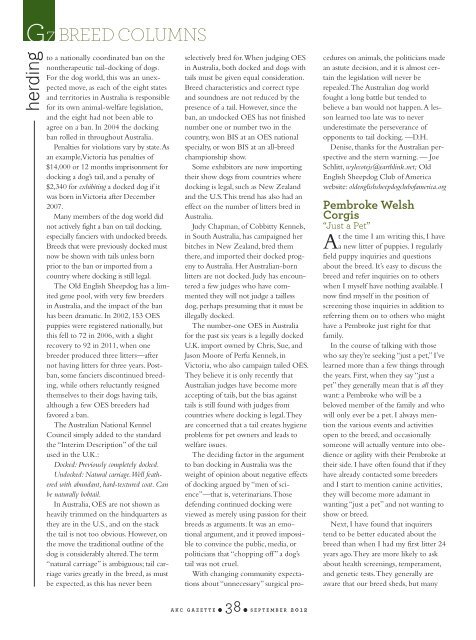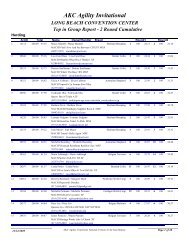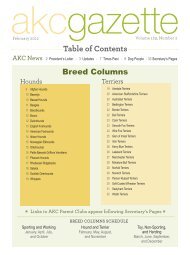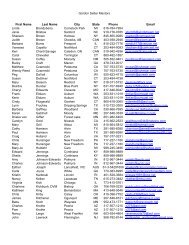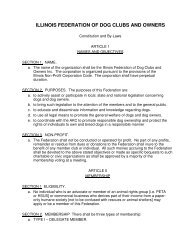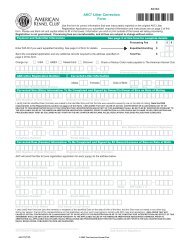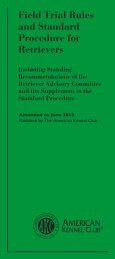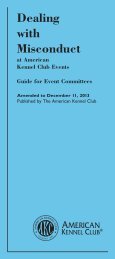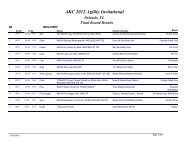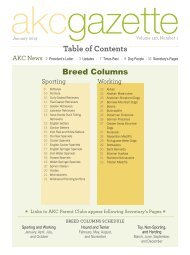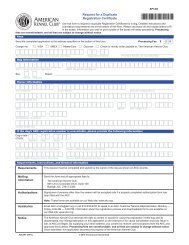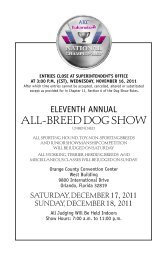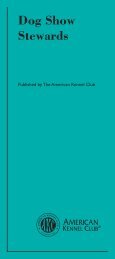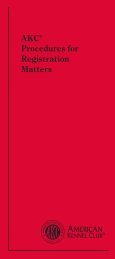Download - Parent Directory - American Kennel Club
Download - Parent Directory - American Kennel Club
Download - Parent Directory - American Kennel Club
- No tags were found...
Create successful ePaper yourself
Turn your PDF publications into a flip-book with our unique Google optimized e-Paper software.
GZ BREED COLUMNSherdingto a nationally coordinated ban on thenontherapeutic tail-docking of dogs.For the dog world, this was an unexpectedmove, as each of the eight statesand territories in Australia is responsiblefor its own animal-welfare legislation,and the eight had not been able toagree on a ban. In 2004 the dockingban rolled in throughout Australia.Penalties for violations vary by state. Asan example, Victoria has penalties of$14,000 or 12 months imprisonment fordocking a dog’s tail, and a penalty of$2,340 for exhibiting a docked dog if itwas born in Victoria after December2007.Many members of the dog world didnot actively fight a ban on tail docking,especially fanciers with undocked breeds.Breeds that were previously docked mustnow be shown with tails unless bornprior to the ban or imported from acountry where docking is still legal.The Old English Sheepdog has a limitedgene pool, with very few breedersin Australia, and the impact of the banhas been dramatic. In 2002, 153 OESpuppies were registered nationally, butthis fell to 72 in 2006, with a slightrecovery to 92 in 2011, when onebreeder produced three litters—afternot having litters for three years. Postban,some fanciers discontinued breeding,while others reluctantly resignedthemselves to their dogs having tails,although a few OES breeders hadfavored a ban.The Australian National <strong>Kennel</strong>Council simply added to the standardthe “Interim Description” of the tailused in the U.K.:Docked: Previously completely docked.Undocked: Natural carriage. Well featheredwith abundant, hard-textured coat. Canbe naturally bobtail.In Australia, OES are not shown asheavily trimmed on the hindquarters asthey are in the U.S., and on the stackthe tail is not too obvious. However, onthe move the traditional outline of thedog is considerably altered. The term“natural carriage” is ambiguous; tail carriagevaries greatly in the breed, as mustbe expected, as this has never beenselectively bred for. When judging OESin Australia, both docked and dogs withtails must be given equal consideration.Breed characteristics and correct typeand soundness are not reduced by thepresence of a tail. However, since theban, an undocked OES has not finishednumber one or number two in thecountry, won BIS at an OES nationalspecialty, or won BIS at an all-breedchampionship show.Some exhibitors are now importingtheir show dogs from countries wheredocking is legal, such as New Zealandand the U.S. This trend has also had aneffect on the number of litters bred inAustralia.Judy Chapman, of Cobbitty <strong>Kennel</strong>s,in South Australia, has campaigned herbitches in New Zealand, bred themthere, and imported their docked progenyto Australia. Her Australian-bornlitters are not docked. Judy has encountereda few judges who have commentedthey will not judge a taillessdog, perhaps presuming that it must beillegally docked.The number-one OES in Australiafor the past six years is a legally dockedU.K. import owned by Chris, Sue, andJason Moore of Perfu <strong>Kennel</strong>s, inVictoria, who also campaign tailed OES.They believe it is only recently thatAustralian judges have become moreaccepting of tails, but the bias againsttails is still found with judges fromcountries where docking is legal. Theyare concerned that a tail creates hygieneproblems for pet owners and leads towelfare issues.The deciding factor in the argumentto ban docking in Australia was theweight of opinion about negative effectsof docking argued by “men of science”—thatis, veterinarians. Thosedefending continued docking wereviewed as merely using passion for theirbreeds as arguments. It was an emotionalargument, and it proved impossibleto convince the public, media, orpoliticians that “chopping off” a dog’stail was not cruel.With changing community expectationsabout “unnecessary” surgical procedureson animals, the politicians madean astute decision, and it is almost certainthe legislation will never berepealed. The Australian dog worldfought a long battle but tended tobelieve a ban would not happen. A lessonlearned too late was to neverunderestimate the perseverance ofopponents to tail docking. —D.H.Denise, thanks for the Australian perspectiveand the stern warning. — JoeSchlitt, wylecotejs@earthlink.net; OldEnglish Sheepdog <strong>Club</strong> of Americawebsite: oldenglishsheepdogclubofamerica.orgPembroke WelshCorgis“Just a Pet”At the time I am writing this, I havea new litter of puppies. I regularlyfield puppy inquiries and questionsabout the breed. It’s easy to discuss thebreed and refer inquiries on to otherswhen I myself have nothing available. Inow find myself in the position ofscreening those inquiries in addition toreferring them on to others who mighthave a Pembroke just right for thatfamily.In the course of talking with thosewho say they’re seeking “just a pet,” I’velearned more than a few things throughthe years. First, when they say “just apet” they generally mean that is all theywant: a Pembroke who will be abeloved member of the family and whowill only ever be a pet. I always mentionthe various events and activitiesopen to the breed, and occasionallysomeone will actually venture into obedienceor agility with their Pembroke attheir side. I have often found that if theyhave already contacted some breedersand I start to mention canine activities,they will become more adamant inwanting “just a pet” and not wanting toshow or breed.Next, I have found that inquirerstend to be better educated about thebreed than when I had my first litter 24years ago. They are more likely to askabout health screenings, temperament,and genetic tests. They generally areaware that our breed sheds, but manyA K C G A Z E T T E • 38 • S E P T E M B E R 2 0 1 2


